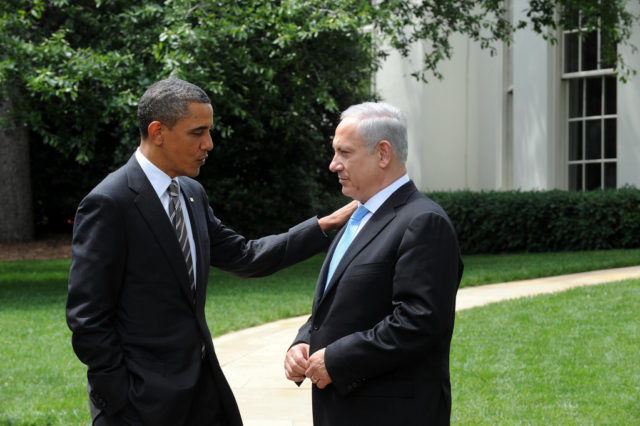
Yes. It is a lot of money.
Yes. A ten-year deal provides a stable base for Israeli planning.
Yes. With the unsettled American political situation and the unsettled military situation in Israel’s neighborhood, stability counts.
No. Israel’s military industries will not collapse without the use of 25% of its American aid internally.
Yes. Israel remains a close and respected ally of the American military establishment.
So why does the new U.S.-Israel Memorandum of Understanding (MOU) feel oddly coercive on the part of President Obama? True, the current U.S. president finds the current prime minister of Israel to be a strategic liability regarding his plans for Iran as well as a general pain in the neck. So there is the “punishment” angle. But at least as important is the ongoing power play between the president and Congress. This encompasses missile defense, an Authorization for the Use of Military Force (AUMA) for Iraq and Syria, climate change, the Iran deal, “no first use” nuclear policy, Israel, and more.
Israel is the target of both direct and indirect presidential fire as the MOU sets out to change fundamental security relations between Israel and the Congress, which, for the past eight years, have been most valuable in the area that President Obama finds least acceptable — missile defense.
In 2012, Defense News wrote that not only had the administration requested a funding cut for jointly developed missile defense programs, but that “this marks the third consecutive year that the administration has requested less funding and it will not be the last, according to its own budget projections.” And, indeed, from the 2010 request (Obama’s first) to the 2017 request (his last) the Administration has shortchanged Israel’s missile defense requirements with the sure knowledge that Congress would put the money back. That way, the president could claim to be a friend of Israel’s defense — by citing the total figure — without actually acknowledging Israel’s needs by putting the money in the Executive Branch request to Congress.
Now President Obama is tying Israel’s hands for the future by extracting a promise that it will not approach Congress for funds in excess of those in the MOU “unless it is at war.” What does that mean? Saudi Arabia, Iraq, Lebanon, Syria still maintain a state of war with Israel, as does Iran, Hamas, Hezbollah and sometimes the Palestinian Authority. Did the Obama Administration leave Israel a loophole for Congressional assistance? Or is it denying that Israel lives in a perpetual and evolving state of threat and often fights “wars” that are essential to the protection of its population, but are not formally declared?
Would the administration agree that the 2014 Gaza operation, launched in response to the launching of more than 4,000 Hamas rockets against Israel, was a “war?” Congress added $42.7 million this year for technology to detect and destroy Hamas cross-border tunnels — in a year in which Israel is no more, or less, “at war” than last year, but in which the number and sophistication of tunnels is growing.
Senator Lindsey Graham (R-SC) is both a staunch supporter of Israel and an opponent of the White House on many issues, from the AUMA to the Iran deal to the climate change agreement the president signed in China. Part of it is protective of the constitutional prerogatives of Congress — on treaties and appropriations — and part is simply about Israel. In an upcoming interview with inFOCUS Quarterly, Sen. Graham said:It should be noted that Congress is not going quietly into the night.
“[The MOU] is an Executive Agreement between the Executive Branch of the United States government and the Prime Minister of Israel. It is not binding on Congress. That [would be] inappropriate… if I’m not part of negotiating the agreement. I wish I had that much say over the Iran deal… Congress has an independent obligation, duty, and responsibility.
“Over the next decade, [Israel] is going to need to spend more on domestic defense, research and development, because the IDF is going to be under more threat, not less. This MOU sends the wrong signal to the Ayatollahs. I am appalled that the administration would (give) the largest state sponsor of terrorism access to $150 billion in sanctions relief without any requirement that they change their behavior. Instead, it is nickeling and diming Israel, and… that’s the wrong ship to sail.
“I am going to introduce a stand-alone supplemental of $1.5 billion dollars. In light of the Iran nuclear deal and the provocative behavior coming out of Iran… I believe the proper response is for Congress to increase assistance to Israel. I’m asking Congress to give Israel 1% of what the $150 billion the Ayatollahs will receive.”
Now, that does not sound like too much to ask. Israel’s choice to sign the MOU is born of internal and external factors. The president’s determination to restrict Israel’s relations with Congress is similarly born. Congress itself is the wild card, and it will have to step up to ensure the security of America’s friend and ally, Israel.

